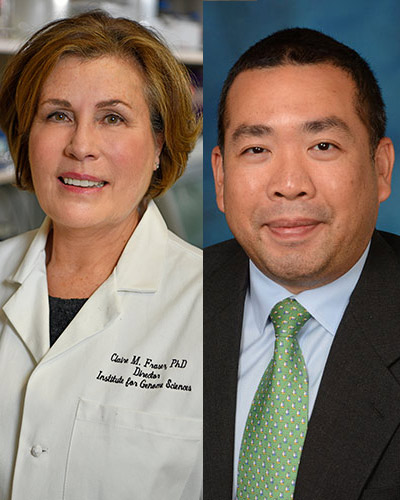February 08, 2016

New Approach Could Lead To Fewer Deaths, and New Treatments
A multi-disciplinary group of researchers at the University of Maryland School of Medicine (UM SOM) have for the first time determined the genetic makeup of various strains of E. coli, which every year kills hundreds of thousands of people around the world.
The paper, which appears in a recent issue of Nature Microbiology, analyzed the DNA of Enteropathogenic Escherichia coli (EPEC), which are the strains of the bacteria that cause diarrhea.
The scientists, led by David Rasko, PhD, Associate Professor of Microbiology and Immunology at the Institute for Genome Sciences (IGS) at UM SOM and Michael Donnenberg, MD, Professor of Medicine at UM SOM, identified certain strains that are typically much more lethal than others. The results will help researchers focus efforts to identify, treat and potentially control these more dangerous versions. This could lead to a better understanding of exactly how the bacteria causes damage, and eventually, more effective treatments that could significantly lower the death rate for diarrheal diseases, which are a leading cause of child mortality around the world. Each year diarrhea kills around 760,000 children under five. It is also is a leading cause of malnutrition in children under five years old. Globally, there are nearly 1.7 billion cases of diarrheal disease every year.
“These findings really help us map the associations between the bacteria and these illnesses in a new way. This kind of research would not have been possible a few years ago,” says Dr. Rasko. “But with new advances, we can make these kinds of exciting discoveries.” Rasko described the research as “genomic epidemiology,” a new way of doing public health science that integrates the most cutting-edge technologies with an extensive knowledge of the pathogenic bacteria, both of which exist at the University of Maryland School of Medicine.
Dr. Rasko and his colleagues, including researchers in The Gambia, Mali, Kenya, Mozambique, India, Pakistan and Bangladesh, examined the genomes of 70 strains of E. coli, which were obtained from infected children enrolled in the Global Enterics Multi-Center study (GEMS). Some of the cases were associated with death, others where had symptoms but no death, and others were not associated with symptoms; as a result, the scientists had access to strains with a range of outcomes.
They analyzed the genetic differences between the strains and mapped them onto disease outcome. Then, they divided the strains into categories, based on genetic content and clinical outcome. They are not sure how the genetic variations may be linked to symptoms and outcomes, but the pattern provides a rich area for further research, Rasko said. He suspects that increased E. coli lethality is caused by a group of genes interacting rather than one or two genes.
“This research epitomizes what IGS is all about,” says Claire M. Fraser, PhD, Director of IGS “We want to take genomics and use it in novel ways, ways that can be of practical use to clinicians around the world.”
Over the past several years, IGS has increasingly taken a larger role in the study of the genetics of infectious disease. In 2014, it was awarded a five-year, $15.2 million grant from the National Institute of Allergy and Infectious Diseases to develop the Genome Center for Infectious Disease.
“This work by Dr. Rasko and his colleagues is on the cutting edge of how scientists can use data and genomics to get at difficult public health questions,” says UM SOM Dean E. Albert Reece, MD, PhD, MBA, who is also Vice President of Medical Affairs at the University of Maryland and the John Z. and Akiko Bowers Distinguished Professor at UM SOM. “I am confident that they will continue to identify crucial leads in our fight to improve the lives of people around the world suffering from disease.”
About the Institute for Genome Sciences
The Institute for Genome Sciences, founded in 2007, is an international research center within the University of Maryland School of Medicine. Comprised of an interdisciplinary, multidepartment team of investigators, the Institute uses the powerful tools of genomics and bioinformatics to understand genome function in health and disease, to study molecular and cellular networks in a variety of model systems, and to generate data and bioinformatics resources of value to the international scientific community.
igs.umaryland.edu
About the University of Maryland School of Medicine
The University of Maryland School of Medicine was chartered in 1807 and is the first public medical school in the United States and continues today as an innovative leader in accelerating innovation and discovery in medicine. The School of Medicine is the founding school of the University of Maryland and is an integral part of the 11-campus University System of Maryland. Located on the University of Maryland’s Baltimore campus, the School of Medicine works closely with the University of Maryland Medical Center and Medical System to provide a research-intensive, academic and clinically based education. With 43 academic departments, centers and institutes, and a faculty of more than 3,000 physicians and research scientists and more than $400 million in extramural funding, the School is regarded as one of the leading biomedical research institutions in the U.S. with top-tier faculty and programs in cancer, brain science, surgery and transplantation, trauma and emergency medicine, vaccine development and human genomics, among other centers of excellence. The School is not only concerned with the health of the citizens of Maryland and the nation, but also has a global presence, with research and treatment facilities in more than 35 countries around the world.
medschool.umaryland.edu
Contact
Office of Public Affairs
655 West Baltimore Street
Bressler Research Building 14-002
Baltimore, Maryland 21201-1559
Contact Media Relations
(410) 706-5260
Related stories

Wednesday, April 05, 2023
Understanding E. Coli Strains That Do Not Cause Diarrhea Could Lead to New Treatments
News reports featuring E. coli often tell terrifying stories of intestinal illness and diarrhea or deadly outbreaks from contaminated food. There are, however, many different strains of the bacteria E. coli, or Escherichia coli, and not all are bad.
.jpg)
Wednesday, March 01, 2023
Internationally-Renowned Scientist Claire Fraser, PhD, To Step Down as Director of the University of Maryland School of Medicine's Institute for Genome Sciences
Claire Fraser, PhD, a pioneer and global leader in genomic research, has announced that she will step down from her position as Director of the Institute for Genome Sciences (IGS) in the University of Maryland School of Medicine (UMSOM). She will now continue as the Dean E. Albert Reece Endowed Professor and Professor of Medicine and Microbiology and Immunology at UMSOM and scientist at IGS until she retires in 2024.

Thursday, June 23, 2022
New Research Shows Mothers’ HIV Status, Breastfeeding, and the Infant Gut Microbiome Can Have Long-Term Impact on Infant Health
Babies born to women with HIV often have poorer health and under-developed growth in the early months of life than infants born to women without the infection — even if those babies don’t contract HIV during birth, according to a new study by researchers at the University of Maryland School of Medicine (UMSOM)’s Institute for Genome Sciences (IGS) and Institute of Human Virology (IHV). The study also provides new insights into why these health issues often continue throughout the babies’ lives.
.jpg)
Wednesday, September 15, 2021
Probiotic-Containing Yogurt Protects Against Microbiome Changes That Lead to Antibiotic-Induced Diarrhea, Study Finds
Eating yogurt containing a particular strain of a well-studied probiotic appears to protect against harmful changes in the gut microbiome that are associated with antibiotic administration. That is the finding from a new randomized clinical trial, led by researchers at the University of Maryland School of Maryland (UMSOM), the University of Maryland School of Pharmacy (UMSOP), and Georgetown University Medical Center, which was recently published in the journal Nutrients.

Thursday, March 18, 2021
UM School of Medicine Helps Maryland Conduct State-Wide Sequencing of Variants in Positive COVID-19 Test Specimens
In an effort to monitor the spread of COVID-19 variants in the State of Maryland, University of Maryland School of Medicine (UMSOM) Dean E. Albert Reece, MD, PhD, MBA, announced that UMaryland Genomics at UMSOM will perform genome sequencing of variants in at least 10 percent of COVID-19 test samples, reaching an important benchmark set by the federal government to help control the spread of these variants.

Tuesday, June 16, 2020
UM School of Medicine Researchers Receive Federal Funding to Rapidly Test New Treatments for COVID-19
Researchers at the University of Maryland School of Medicine (UMSOM) will be partnering on an agreement funded by the federal government’s Defense Advanced Research Projects Agency (DARPA) to rapidly test hundreds of drugs, approved and marketed for other conditions, to see whether any can be repurposed to prevent or treat COVID-19. The compounds will be tested in studies using state-of-the-art technologies in the laboratory of coronavirus researcher Matthew Frieman, PhD., Associate Professor of Microbiology and Immunology at the University of Maryland School of Medicine. UMSOM will receive up to $3.6 million over the next year to fund this effort.

Tuesday, February 12, 2019
UMSOM Scientists Call for Unrestricted Usage of Public Genome Data
Researchers at the Institute for Genome Sciences (IGS) at the University of Maryland School of Medicine (UMSOM) called for open access to genome data, stating that unrestricted usage is needed for progress in combating the world’s most serious diseases.

Tuesday, December 04, 2018
UMSOM/UMSOP Researchers Awarded $1.78 Million Grant to Study Brain-To-Gut Connection in Schizophrenia
Researchers at the University of Maryland School of Medicine’s (UMSOM) Maryland Psychiatric Center (MPRC) and Institute for Genome Sciences (IGS), along with researchers at the University of Maryland School of Pharmacy (UMSOP), have been awarded a collaborative five-year $1.78 million grant to study the brain-to-gut connection in schizophrenia.

Thursday, January 21, 2016
UM SOM Board Member and Benefactor Robert E. Fischell, Awarded Presidential Medal
The White House has awarded Robert E. Fischell, ScD, a member of the University of Maryland School of Medicine (UM SOM) Board of Visitors, the National Medal of Technology and Innovation, the highest honor for technological achievement bestowed by the president of the United States. Previous recipients have included such luminaries as Steven Jobs and Stephen Wozniak (Apple Computer, Inc.), Stephen D. Bechtel, Jr. (Bechtel Group, Inc.), David Packard (Hewlett-Packard Company), Clarence L. Johnson (Lockheed Corporation), Edwin H. Land (Polaroid Corporation) and Edith Flanigen (Union Carbide).
